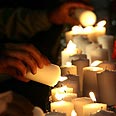
Israeli-Arabs speak out on Holocaust
Israeli-Arabs call for tolerance, reject comparisons between Palestinian suffering and Holocaust
Khaled Mahamid, a 43-year-old lawyer from the Israeli-Arab village of Umm al-Fahm, has pictures in his office from the Holocaust purchased from the Yad Vashem Holocaust Museum in Jerusalem and also runs an Internet web site that explains the Holocaust in Arabic, Hebrew and English.
“My dream is to take a Holocaust survivor to the Palestinian refugee camps so that the Palestinians can learn exactly what happened during the Holocaust,” he said. “Arabs should be made to be shocked about the Holocaust, because they don’t even approach the subject.”
“The entire conflict is built on the gap in both sides’ knowledge of the Holocaust,” he added.” If the Arabs understood it, the conflict would disappear within months. It’s about time the Arabs understand the Holocaust remains in the heart of every Jew and that it cannot be ignored.”
Israeli-Arab legislators speak out
Many Israeli-Arabs, who remained in Israel after the 1948 Independence Day War, make up about 20 percent of Israel's population of 6.8 million and have long accused the Jewish state of treating them like second-class citizens.
Knesset member Ahmed Tibi said Jews had failed to understand the suffering of others, especially the Palestinians.
“Nazism is a problem for all humankind because it’s a crime against humanity and it’s important the Jews spearhead the battle against racism,” he said. “Unfortunately, during the last few years under the cover of security, racism has become part of the mainstream in Israeli society.”
Taleb a-Sana, another Israeli-Arab legislator, said the Holocaust helped establish the state of Israel “at the expense of the Palestinian people."
But Knesset member Jamal Zahalka said he “identified strongly” with the pain of Holocaust victims.
“I feel the pain of all the victims of Nazism - the Jews, the gypsies and the others. I think that’s a given.”
Arab media around the world tends to bury reports of the Holocaust in sidebars and compare Nazi Germany to Israel, a comparison Tibi, a-Sana and Zahalka condemned.
“There is no parallel between what the Nazis did...and (what is happening in Israel) today,” Tibi said. “The message of the depressing and ugly occupation that makes the lives of the Palestinians miserable is sent to the world even without Hitler and Nazi Germany.”
A-Sana, too, said such comparisons undermine the Palestinian cause.
“The moment we compare the problem loses its proportion and support,” he says. “There is enough (Palestinian) suffering and there is no need to add on.”
All three Knesset members said they would observe a nation-wide minute of silence for Holocaust victims.










